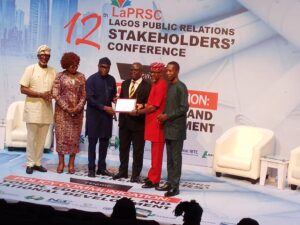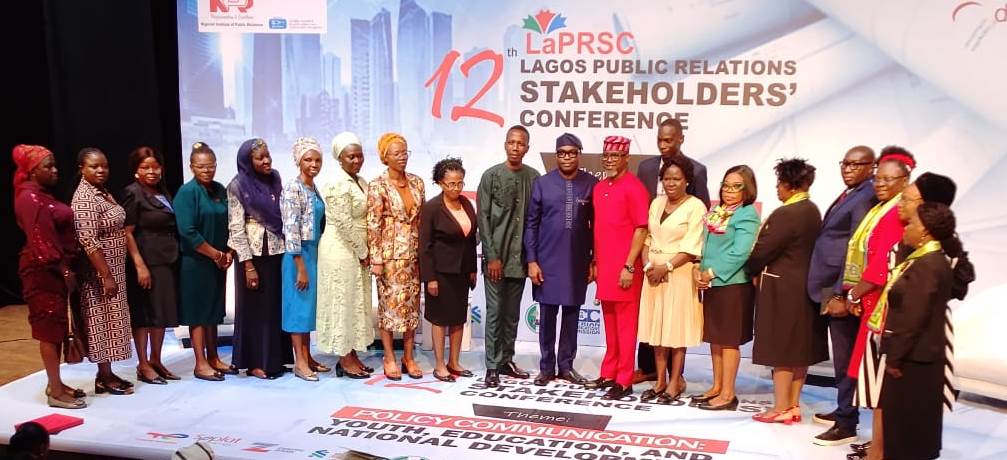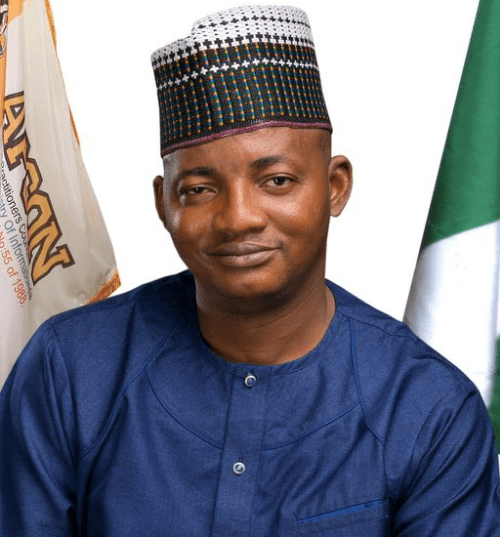Stakeholders at the 12th Lagos Public Relations Stakeholders’ Conference (LaPRSC), held at the historic Muson Centre, Lagos, stressed the urgent need for reforms in Nigeria’s education sector.
They argued that policies must be action-driven, communication must be clear and inclusive, and investments must empower young people with skills to thrive in a rapidly changing world.

Experts at LaPRSC 2025
Adesua Adewole: Policies Must Drive Action, Not Paper
Adesua Adewole, General Manager, Country Services at TotalEnergies, urged policymakers to ensure that education policies go beyond paperwork to deliver tangible impact.
She warned that “policies should not just be written on paper, they should power education,” adding that the real measure of progress lies in execution, not bureaucracy.
Moreover, Adewole outlined TotalEnergies’ long-standing contributions to education in Nigeria, including the establishment of the Institute of Petroleum and Energy Studies (IPES) in 2003, a joint initiative with NNPC Limited, IFP School in France, and the University of Port Harcourt.
So far, over 705 graduates have earned advanced degrees through IPES, with at least 93 alumni currently working with TotalEnergies.
At the secondary level, the company has sponsored book-reading programs in Lagos and Port Harcourt, donated ICT equipment to IPES and the University of Port Harcourt, and invested in scholarships benefiting over 30,000 students from host communities.
Adewole also highlighted the company’s Powering the Teachers program, launched in 2011, which sends Nigerian lecturers to the Massachusetts Institute of Technology (MIT) for advanced training.
“These efforts,” she stressed, “are not just bold words. They are lifelines for the next generation.”
Communication as the Bridge Between Policy and Impact
Professor Chiso Ndukwe-Okafor, Executive Director of the Consumer Advocacy and Empowerment Foundation (CADEF), emphasised that effective policy communication is as critical as the policies themselves.
“Effective communication is the bridge between policy intent and actual impact,” she said.
For instance, drawing examples from Rwanda’s Youth Connect Africa initiative and Singapore’s SkillsFuture program, Ndukwe-Okafor argued that when youth are placed at the center of policy communication, nations achieve transformation.
She lamented that in Nigeria, education policies often falter because of fragmented communication, mistrust, digital divides, and a lack of youth engagement.
“Education is the most vital investment a nation can make,” she declared. “But when policies are poorly communicated, even the best reforms will fail to take root.”
She outlined three critical elements of effective communication:
- Clarity – Policies should be explained in simple, relatable language.
- Accessibility – Channels must reach youth where they are: schools, communities, and online.
- Engagement – Young people should be consulted, not just informed.
“When policy communication is clear, inclusive, and participatory,” she concluded, “it becomes a powerful tool for ownership, accountability, and transformation.”
Government Commitment to Inclusive and Digital Education
Mr. Jamiu Tolani Alli-Balogun, Lagos State Commissioner for Basic and Secondary Education, reaffirmed the Lagos State government’s commitment to building an inclusive and digitally driven education system.
He explained that effective policy communication is essential in bridging the gap between formulation, implementation, and public understanding.
Furthermore, Alli-Balogun highlighted key Lagos State initiatives, including free access to basic education, digital literacy programs, vocational training, sports development, mental health support, and reproductive health education.
He noted that these interventions aim to empower youth with practical and digital skills, nurture talent, and reduce out-of-school children.
The Commissioner also detailed the state’s investments in school infrastructure, teacher training, and inclusive education for children with disabilities.
Recently, Lagos commissioned 17 new schools to expand access, while also paying WAEC and Junior WAEC fees for students in public schools.
Beyond secondary education, Alli-Balogun said Lagos is strengthening tertiary institutions like The Lagos State University (LASU), Lagos State University of Education (LASUED), and Lagos State University of Science and Technology (LASUSTECH) to improve research and skill acquisition in areas such as AI, digital marketing, coding, and entrepreneurship.
He further pointed to Lagos State’s empowerment and funding initiatives, including a ₦500 billion Uptick Guarantee Fund for food security, the Assam Eco Loan Scheme for SMEs, and the Lagos State Empowerment Trust Fund, which has disbursed ₦25 million in grants and loans to small businesses.
“Build the youth, build the nation,” Alli-Balogun affirmed, underscoring that education remains central to Lagos State’s developmental agenda.
A Collective Call for Change
Together, the speakers reinforced that Nigeria’s education system is at a critical turning point.
Policies must be clear, inclusive, and actionable; investments must prepare youth for global competitiveness; and government, private sector, and civil society must collaborate to make education not just a promise, but a lived reality.
WATCH ALSO:MARKETING EDGE ONTV






Comment
No comments found.